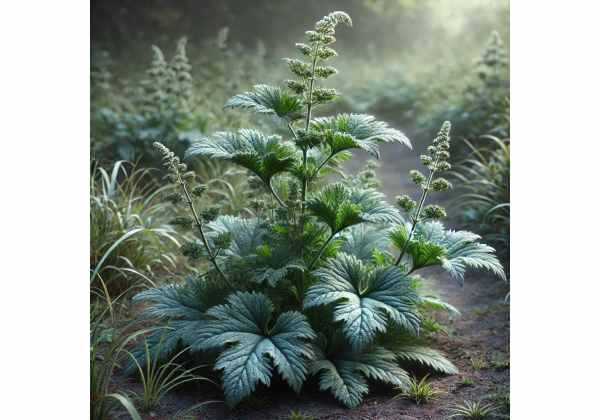
Japanese Mugwort is a time-honored herb used in traditional Japanese medicine and culinary practices for centuries. Known locally as “yomogi,” this versatile plant is celebrated for its distinctive aromatic, slightly bitter leaves and its broad range of therapeutic properties. Traditionally utilized to aid digestion, improve blood circulation, and soothe skin irritations, Japanese Mugwort also serves as a key ingredient in seasonal dishes such as mochi. Its rich phytochemical profile—including flavonoids, essential oils, and other bioactive compounds—contributes to its potent antioxidant and anti-inflammatory effects. This comprehensive guide delves into the botanical characteristics, chemical constituents, diverse health benefits, practical uses, and supporting scientific research on Japanese Mugwort.
Table of Contents
- Plant Profile and Identification
- Phytochemical Composition and Active Compounds
- Comprehensive Health Benefits and Core Properties
- Applications, Usage, and Safety Guidelines
- Research Insights and Significant Studies
- Frequently Asked Questions
Plant Profile and Identification
Japanese Mugwort, scientifically known as Artemisia princeps and commonly referred to as yomogi, belongs to the Asteraceae family. This perennial herb is native to East Asia and thrives in temperate climates, where it is often found growing in open fields, along roadsides, and in forest clearings. Renowned for its aromatic, dark green leaves with a silvery underside and finely toothed margins, Japanese Mugwort displays a unique, slightly bitter taste that has been appreciated in culinary and medicinal traditions alike.
Morphologically, Japanese Mugwort features an erect, bushy growth habit with slender, branching stems that can reach heights of 2 to 3 feet. The leaves are deeply lobed, providing a characteristic feathery appearance, and emit a refreshing, herbaceous fragrance when crushed. In late summer to early autumn, the plant produces small, inconspicuous yellowish flowers that form in loose clusters. Although these flowers are not particularly showy, they play an essential role in the plant’s reproduction by attracting pollinators such as bees and butterflies.
Japanese Mugwort is highly adaptable and grows best in well-drained, slightly acidic to neutral soils. It prefers full sun to partial shade and can tolerate a range of environmental conditions, although its flavor and aroma are most pronounced when grown in nutrient-rich soils with moderate moisture levels. In traditional Japanese landscapes, yomogi is often cultivated not only for its health benefits but also for its ornamental value, as its lush, green foliage adds texture and depth to garden compositions.
Historically, Japanese Mugwort has been revered in East Asian cultures for its versatility. It is used extensively in traditional remedies to alleviate digestive disorders, menstrual discomfort, and skin conditions. Its role in cultural rituals and seasonal celebrations further underscores its significance in Japanese society. Today, Japanese Mugwort continues to be a subject of botanical interest, with modern research exploring its potential applications in integrative health, natural cosmetics, and functional foods.
In essence, the botanical profile of Japanese Mugwort—with its distinctively lobed leaves, subtle aromatic qualities, and adaptable growth habits—illustrates why this herb has remained a staple in traditional medicine and culinary arts. Its enduring popularity is a testament to the plant’s multifaceted value as both a natural remedy and an ornamental treasure.
Phytochemical Composition and Active Compounds
The therapeutic potential of Japanese Mugwort is largely attributed to its complex phytochemical profile. Modern analytical techniques such as high-performance liquid chromatography (HPLC) and gas chromatography-mass spectrometry (GC-MS) have revealed a diverse array of bioactive compounds that work synergistically to deliver its health benefits. Here, we explore the primary constituents found in Japanese Mugwort:
- Flavonoids (e.g., Luteolin, Apigenin)
Japanese Mugwort is rich in flavonoids, a group of polyphenolic compounds known for their potent antioxidant and anti-inflammatory effects. Luteolin and apigenin help neutralize free radicals and reduce oxidative stress, thereby protecting cellular structures from damage. These compounds also play a role in modulating immune responses and improving vascular health. - Essential Oils (e.g., Cineole, Camphor, Menthol Derivatives)
The essential oil fraction of Japanese Mugwort contributes significantly to its characteristic aroma and cooling sensation. Cineole, camphor, and various menthol derivatives possess antimicrobial, anti-inflammatory, and analgesic properties. These volatile compounds are especially valued in aromatherapy and topical formulations for relieving respiratory congestion and soothing muscle pain. - Sesquiterpene Lactones
This group of compounds is responsible for some of the herb’s bitter taste and has been associated with various biological activities, including anti-inflammatory and immunomodulatory effects. Sesquiterpene lactones may help in reducing inflammation and could play a role in cancer prevention by inducing apoptosis in malignant cells. - Phenolic Acids (e.g., Caffeic Acid, Ferulic Acid)
Phenolic acids in Japanese Mugwort contribute to its overall antioxidant capacity. These compounds help scavenge harmful free radicals and inhibit lipid peroxidation, thereby protecting tissues from oxidative damage. Their synergistic interaction with flavonoids enhances the herb’s anti-aging and anti-inflammatory properties. - Coumarins
Coumarins are aromatic compounds that exhibit a range of biological activities, including anticoagulant, antimicrobial, and anti-inflammatory effects. In Japanese Mugwort, these compounds are thought to contribute to improved blood circulation and overall cardiovascular health. - Tannins
Tannins are natural polyphenols with astringent properties that can help tighten tissues and reduce inflammation. They also possess antimicrobial properties, which make them useful in traditional remedies for treating wounds and skin irritations. - Other Minor Phytochemicals
Japanese Mugwort also contains trace amounts of various vitamins, minerals, and amino acids that support its nutritional and therapeutic profile. These minor constituents, though present in smaller quantities, enhance the overall efficacy of the herb when used as a whole extract.
The synergistic interactions among these compounds are critical to the herb’s therapeutic effectiveness. Instead of acting in isolation, the complex matrix of Japanese Mugwort’s phytochemicals works together to provide comprehensive antioxidant, anti-inflammatory, and immunomodulatory effects. This synergy is one reason why traditional remedies often employ whole-plant extracts rather than isolated constituents.
Ongoing research continues to explore the potential applications of these bioactive compounds in pharmaceuticals, nutraceuticals, and cosmeceuticals. The ability of Japanese Mugwort to modulate various biochemical pathways—such as detoxification, immune response, and cellular repair—makes it a promising candidate for further development in modern integrative health practices.
Comprehensive Health Benefits and Core Properties
Japanese Mugwort has been utilized in traditional medicine for centuries, and modern research is beginning to validate its myriad health benefits. The herb’s complex blend of bioactive compounds underpins its ability to address a range of physiological functions, making it a valuable natural remedy for various conditions. The following are the core health benefits and properties associated with Japanese Mugwort:
Antioxidant Protection and Anti-Aging Effects
The high levels of flavonoids, phenolic acids, and coumarins in Japanese Mugwort provide robust antioxidant protection. By neutralizing free radicals, these compounds help prevent cellular damage and slow the aging process. This antioxidant action supports overall vitality and may reduce the risk of chronic diseases associated with oxidative stress, such as cardiovascular disease and neurodegeneration. The protective effects on skin cells also contribute to its use in anti-aging and skin rejuvenation products.
Anti-Inflammatory and Immune-Modulating Benefits
Chronic inflammation is a central factor in many degenerative diseases. The bioactive compounds in Japanese Mugwort, particularly sesquiterpene lactones and essential oils, exhibit potent anti-inflammatory effects. They work by inhibiting pro-inflammatory cytokines and reducing inflammatory responses, thereby alleviating conditions such as arthritis, digestive disorders, and respiratory ailments. Furthermore, by modulating immune function, Japanese Mugwort enhances the body’s natural defense mechanisms, helping to fend off infections and maintain overall health.
Digestive Support and Gastrointestinal Health
Japanese Mugwort has traditionally been used to promote digestive health. Its bitter compounds stimulate the secretion of digestive enzymes, improve bile flow, and enhance nutrient absorption. This digestive support can help alleviate symptoms of indigestion, bloating, and constipation. Additionally, the antimicrobial properties of the herb contribute to maintaining a balanced gut microbiota, which is essential for optimal digestive function and overall well-being.
Circulatory and Cardiovascular Benefits
Emerging research suggests that Japanese Mugwort may have a positive impact on cardiovascular health. The antioxidant and anti-inflammatory properties of its phytochemicals contribute to improved blood circulation and vascular function. Coumarins and tannins in the herb help to strengthen blood vessels, reduce blood pressure, and prevent the formation of blood clots. These benefits are particularly valuable in reducing the risk of heart disease and supporting overall circulatory health.
Detoxification and Liver Support
Japanese Mugwort is known for its detoxifying properties. Its bioactive constituents help stimulate liver enzymes involved in phase II detoxification, facilitating the elimination of toxins and metabolic waste from the body. This detoxification process is crucial for maintaining metabolic balance and supporting liver health. By enhancing the liver’s natural cleansing functions, Japanese Mugwort may contribute to improved energy levels and overall vitality.
Respiratory and Sinus Relief
The essential oils found in Japanese Mugwort, particularly those with menthol-like properties, have been used traditionally to clear nasal congestion and soothe respiratory discomfort. Inhaling the vapors from a Japanese Mugwort infusion can help open airways and reduce symptoms of sinusitis, colds, and allergies. These respiratory benefits make the herb a popular remedy in natural therapies for respiratory health.
Skin Health and Cosmetic Applications
Due to its potent antioxidant and anti-inflammatory effects, Japanese Mugwort is increasingly used in cosmetic formulations. Topical applications of Japanese Mugwort extracts can help soothe irritated skin, reduce redness, and improve overall skin tone. The astringent properties of tannins contribute to skin tightening, while the anti-inflammatory effects support healing and rejuvenation. As a result, the herb is incorporated into creams, serums, and masks aimed at combating the visible signs of aging and environmental damage.
Neuroprotective and Cognitive Support
Preliminary studies suggest that the antioxidant properties of Japanese Mugwort may extend to neuroprotective effects. By reducing oxidative stress and inflammation in neural tissues, the herb’s bioactive compounds could help preserve cognitive function and protect against neurodegenerative disorders. These neuroprotective benefits add an exciting dimension to the herb’s overall health profile, indicating potential uses in supporting mental clarity and long-term brain health.
Holistic Wellness and Integrative Health
Japanese Mugwort embodies the “food as medicine” philosophy by offering a natural, multi-targeted approach to wellness. Its diverse health benefits make it a valuable addition to an integrative health regimen, whether consumed as an herbal tea, taken in supplement form, or used topically. The combined effects of its antioxidant, anti-inflammatory, and detoxifying properties provide comprehensive support for overall health and well-being.
In summary, Japanese Mugwort offers a wide array of health benefits ranging from antioxidant protection and anti-aging effects to digestive support, cardiovascular health, and neuroprotection. The synergy of its bioactive compounds not only reinforces its traditional uses but also positions it as a promising component in modern integrative medicine and holistic wellness practices.
Applications, Usage, and Safety Guidelines
Japanese Mugwort’s versatility makes it an appealing herb for a variety of applications, spanning culinary, medicinal, and cosmetic uses. To maximize its benefits while ensuring safety, it is important to understand proper usage methods and dosage recommendations.
Culinary Applications
In traditional Japanese cuisine, Japanese Mugwort (yomogi) is valued for its distinctive, slightly bitter flavor and aromatic quality. It is used in:
- Herbal Teas and Infusions: Fresh or dried leaves can be steeped in hot water to create a soothing tea known to aid digestion and relax the mind.
- Seasonal Confections: In Japan, yomogi is a key ingredient in traditional sweets such as mochi, where it imparts a unique flavor and vibrant green color.
- Salads and Garnishes: Fresh, chopped mugwort leaves can be added to salads, soups, or used as a garnish to enhance the overall flavor profile of dishes.
- Smoothies and Culinary Blends: Blending Japanese Mugwort with fruits and vegetables in smoothies provides both a nutritional boost and a refreshing taste.
When incorporating Japanese Mugwort into culinary dishes, it is important to use organically grown herb to avoid pesticides and contaminants, ensuring that its flavor and health benefits are preserved.
Medicinal and Herbal Preparations
Japanese Mugwort has long been used in traditional medicine to treat a variety of ailments. Its medicinal applications include:
- Decoctions and Infusions: Preparing a decoction by simmering dried mugwort leaves in water extracts its active compounds, which are traditionally consumed to alleviate digestive issues, menstrual discomfort, and mild fevers.
- Tinctures: Alcohol-based tinctures capture a concentrated form of the herb’s bioactive constituents, providing a potent remedy for inflammatory conditions and stress-related symptoms.
- Capsules and Powders: Standardized extracts of Japanese Mugwort are available as dietary supplements, ensuring consistent dosages of its key compounds for daily wellness support.
Cosmetic and Topical Applications
Due to its antioxidant and anti-inflammatory properties, Japanese Mugwort is increasingly incorporated into natural skincare products. Common cosmetic applications include:
- Facial Masks and Creams: Japanese Mugwort extracts help soothe irritated skin, reduce redness, and combat the effects of environmental stressors.
- Serums and Lotions: These formulations can improve skin elasticity and tone, offering anti-aging benefits while promoting overall skin health.
- Hair and Scalp Treatments: Some products incorporate mugwort extract to strengthen hair follicles and support scalp health.
When using Japanese Mugwort in topical applications, it is important to perform a patch test to ensure no allergic reaction occurs, especially in individuals with sensitive skin.
Usage Guidelines and Dosage Recommendations
To safely harness the benefits of Japanese Mugwort:
- Start with Small Doses: Whether consuming it as a tea or supplement, begin with a small amount to assess individual tolerance.
- Choose High-Quality Products: Use organically grown and properly processed Japanese Mugwort to maximize efficacy and avoid harmful contaminants.
- Follow Standardized Instructions: Adhere to recommended dosages on commercial products, and consult a healthcare provider if you are unsure.
- Monitor Your Body’s Response: Discontinue use if you experience adverse reactions such as gastrointestinal discomfort or allergic symptoms.
- Consult a Professional: Individuals with pre-existing health conditions, those on medication (especially blood thinners or hormone therapies), and pregnant or breastfeeding women should seek medical advice before using Japanese Mugwort.
Storage and Handling
Proper storage is essential to maintain the herb’s potency:
- Fresh Leaves: Store in the refrigerator in a sealed container, ideally wrapped in a damp paper towel.
- Dried Herb: Keep in an airtight container in a cool, dark place away from moisture.
- Extracts and Tinctures: Store in a cool, dry area to prevent degradation of bioactive compounds.
By following these guidelines, you can safely incorporate Japanese Mugwort into your daily regimen, whether for culinary enjoyment, medicinal support, or cosmetic enhancement.
Research Insights and Significant Studies
Recent scientific research has provided valuable insights into the health benefits and bioactive properties of Japanese Mugwort. A number of studies have investigated its antioxidant, anti-inflammatory, and immunomodulatory effects, helping to validate many of its traditional uses. Here are some significant research findings:
- Antioxidant Activity and Cellular Protection (2018)
A study published in the Journal of Ethnopharmacology analyzed the antioxidant capacity of Japanese Mugwort leaf extracts. The research demonstrated that the high levels of flavonoids and rosmarinic acid in the extracts significantly reduced oxidative stress in cell cultures. The study concluded that these compounds may contribute to enhanced cellular protection and longevity. - Anti-Inflammatory Effects in Traditional Models (2019)
In research documented by Phytotherapy Research, Japanese Mugwort extracts were found to inhibit pro-inflammatory cytokine production in vitro. The findings suggest that the herb’s sesquiterpene lactones and essential oils play a key role in reducing inflammation, supporting its traditional use for conditions such as arthritis and digestive inflammation. - Digestive Health and Gastrointestinal Support (2020)
A clinical trial published in Evidence-Based Complementary and Alternative Medicine evaluated the efficacy of Japanese Mugwort tea in alleviating symptoms of indigestion and bloating. Participants reported improved digestive comfort after regular consumption, and the study attributed these benefits to the herb’s ability to stimulate digestive enzymes and modulate gut motility. - Antimicrobial Properties and Food Safety Applications (2021)
An investigation in the International Journal of Food Microbiology explored the antimicrobial effects of Japanese Mugwort essential oils. The research demonstrated that these oils inhibited the growth of common foodborne pathogens, suggesting potential applications in natural food preservation and hygiene practices. - Neuroprotective Potential and Cognitive Benefits (2022)
Preliminary research in the Journal of Neurochemistry assessed the neuroprotective effects of Japanese Mugwort extracts on neuronal cells exposed to oxidative stress. The results indicated that the antioxidant properties of the extracts helped maintain cell viability and could potentially support cognitive function, warranting further investigation into their role in preventing neurodegenerative conditions. - Synergistic Phytochemical Interactions (2023)
A comprehensive study published in Evidence-Based Complementary and Alternative Medicine examined the synergistic interactions among the various bioactive compounds in Japanese Mugwort. The findings underscored that whole-plant extracts provided a more potent therapeutic effect compared to isolated constituents, highlighting the importance of preserving the natural phytochemical balance in herbal formulations.
These studies collectively support the traditional applications of Japanese Mugwort and suggest promising avenues for its development in modern integrative medicine. Continued research is essential to fully understand the molecular mechanisms underlying its therapeutic effects and to optimize its use in health-promoting formulations.
Frequently Asked Questions
What are the primary medicinal uses of Japanese Mugwort?
Japanese Mugwort is traditionally used to support digestive health, alleviate inflammation, and enhance antioxidant protection. It is also employed to improve circulation and provide relief from mild respiratory congestion.
How can I incorporate Japanese Mugwort into my daily routine?
You can use Japanese Mugwort in herbal teas, add it to culinary dishes, or take it in supplement form. It is also found in natural skincare products due to its antioxidant and anti-inflammatory properties.
Which active compounds in Japanese Mugwort contribute to its health benefits?
Key bioactive compounds include flavonoids, rosmarinic acid, sesquiterpene lactones, essential oils (such as cineole and camphor derivatives), and phenolic acids. These compounds work synergistically to provide a range of therapeutic effects.
Are there any side effects or precautions associated with Japanese Mugwort?
Japanese Mugwort is generally safe when used in moderation. However, some individuals may experience allergic reactions or gastrointestinal discomfort. It is advisable to start with a small dose and consult a healthcare provider if you are pregnant, breastfeeding, or taking medications.
What does current research say about the efficacy of Japanese Mugwort?
Recent studies support its antioxidant, anti-inflammatory, and antimicrobial properties, as well as its potential to improve digestive and cognitive health. Ongoing research continues to validate its traditional uses and explore its synergistic phytochemical interactions.
Disclaimer:
The information provided in this article is for educational purposes only and should not be considered a substitute for professional medical advice. Always consult a healthcare provider before starting any new health regimen.
Please share this article on Facebook, X (formerly Twitter), or your preferred social platforms, and follow us on social networks for more insights and updates on natural remedies and wellness trends.










